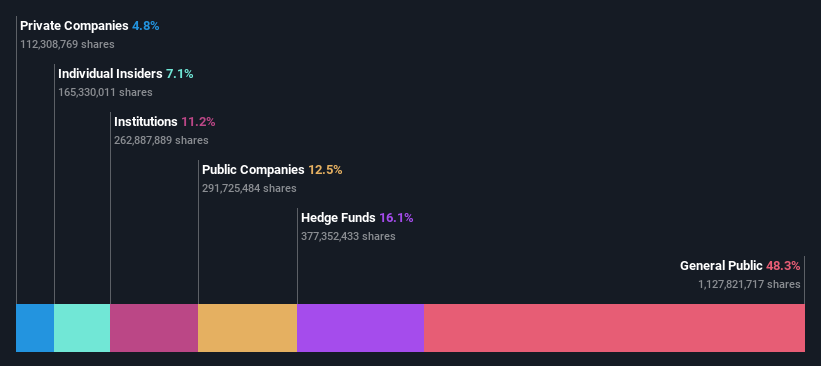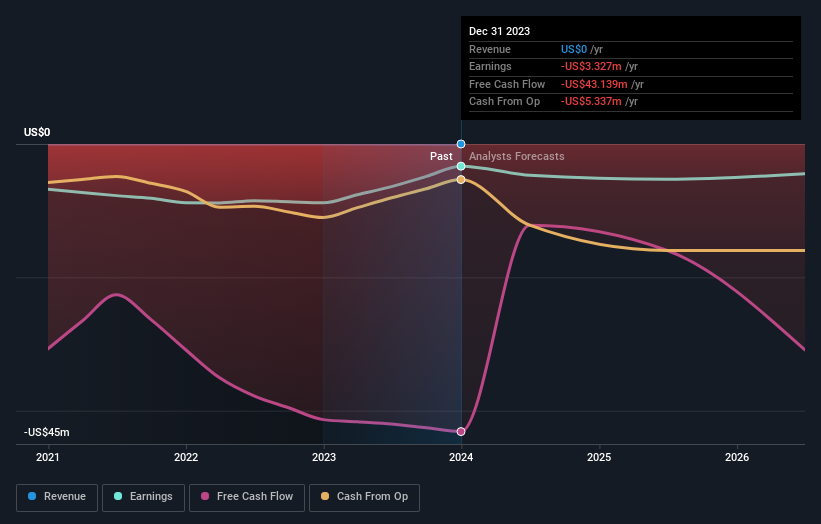- Australia
- /
- Metals and Mining
- /
- ASX:INR
ioneer Ltd's (ASX:INR) market cap surged AU$35m last week, retail investors who have a lot riding on the company were rewarded

Key Insights
- ioneer's significant retail investors ownership suggests that the key decisions are influenced by shareholders from the larger public
- The top 18 shareholders own 50% of the company
- 11% of ioneer is held by Institutions
Every investor in ioneer Ltd (ASX:INR) should be aware of the most powerful shareholder groups. We can see that retail investors own the lion's share in the company with 48% ownership. Put another way, the group faces the maximum upside potential (or downside risk).
Clearly, retail investors benefitted the most after the company's market cap rose by AU$35m last week.
In the chart below, we zoom in on the different ownership groups of ioneer.
View our latest analysis for ioneer

What Does The Institutional Ownership Tell Us About ioneer?
Institutions typically measure themselves against a benchmark when reporting to their own investors, so they often become more enthusiastic about a stock once it's included in a major index. We would expect most companies to have some institutions on the register, especially if they are growing.
ioneer already has institutions on the share registry. Indeed, they own a respectable stake in the company. This implies the analysts working for those institutions have looked at the stock and they like it. But just like anyone else, they could be wrong. It is not uncommon to see a big share price drop if two large institutional investors try to sell out of a stock at the same time. So it is worth checking the past earnings trajectory of ioneer, (below). Of course, keep in mind that there are other factors to consider, too.

It would appear that 16% of ioneer shares are controlled by hedge funds. That worth noting, since hedge funds are often quite active investors, who may try to influence management. Many want to see value creation (and a higher share price) in the short term or medium term. Centaurus Capital Limited is currently the company's largest shareholder with 16% of shares outstanding. The second and third largest shareholders are UBS Group AG and Sibanye Stillwater Limited, with an equal amount of shares to their name at 6.2%. Additionally, the company's CEO Bernard Rowe directly holds 3.0% of the total shares outstanding.
A closer look at our ownership figures suggests that the top 18 shareholders have a combined ownership of 50% implying that no single shareholder has a majority.
Researching institutional ownership is a good way to gauge and filter a stock's expected performance. The same can be achieved by studying analyst sentiments. While there is some analyst coverage, the company is probably not widely covered. So it could gain more attention, down the track.
Insider Ownership Of ioneer
The definition of company insiders can be subjective and does vary between jurisdictions. Our data reflects individual insiders, capturing board members at the very least. The company management answer to the board and the latter should represent the interests of shareholders. Notably, sometimes top-level managers are on the board themselves.
I generally consider insider ownership to be a good thing. However, on some occasions it makes it more difficult for other shareholders to hold the board accountable for decisions.
We can report that insiders do own shares in ioneer Ltd. It has a market capitalization of just AU$316m, and insiders have AU$22m worth of shares, in their own names. It is good to see some investment by insiders, but it might be worth checking if those insiders have been buying.
General Public Ownership
With a 48% ownership, the general public, mostly comprising of individual investors, have some degree of sway over ioneer. This size of ownership, while considerable, may not be enough to change company policy if the decision is not in sync with other large shareholders.
Private Company Ownership
It seems that Private Companies own 4.8%, of the ioneer stock. It's hard to draw any conclusions from this fact alone, so its worth looking into who owns those private companies. Sometimes insiders or other related parties have an interest in shares in a public company through a separate private company.
Public Company Ownership
We can see that public companies hold 12% of the ioneer shares on issue. We can't be certain but it is quite possible this is a strategic stake. The businesses may be similar, or work together.
Next Steps:
I find it very interesting to look at who exactly owns a company. But to truly gain insight, we need to consider other information, too. For instance, we've identified 4 warning signs for ioneer (2 are significant) that you should be aware of.
But ultimately it is the future, not the past, that will determine how well the owners of this business will do. Therefore we think it advisable to take a look at this free report showing whether analysts are predicting a brighter future.
NB: Figures in this article are calculated using data from the last twelve months, which refer to the 12-month period ending on the last date of the month the financial statement is dated. This may not be consistent with full year annual report figures.
Valuation is complex, but we're here to simplify it.
Discover if ioneer might be undervalued or overvalued with our detailed analysis, featuring fair value estimates, potential risks, dividends, insider trades, and its financial condition.
Access Free AnalysisHave feedback on this article? Concerned about the content? Get in touch with us directly. Alternatively, email editorial-team (at) simplywallst.com.
This article by Simply Wall St is general in nature. We provide commentary based on historical data and analyst forecasts only using an unbiased methodology and our articles are not intended to be financial advice. It does not constitute a recommendation to buy or sell any stock, and does not take account of your objectives, or your financial situation. We aim to bring you long-term focused analysis driven by fundamental data. Note that our analysis may not factor in the latest price-sensitive company announcements or qualitative material. Simply Wall St has no position in any stocks mentioned.
About ASX:INR
ioneer
Engages in the exploration and development of mineral properties in North America.
Medium-low with adequate balance sheet.

